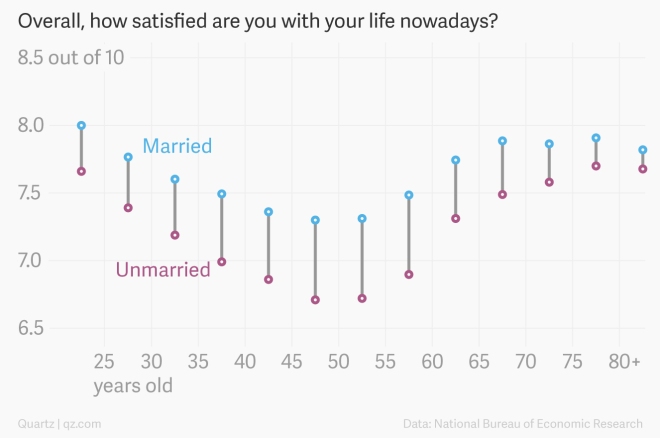Hanna Kozlowska passes along some new research indicating that marriage-based happiness has some serious staying power:
Analyzing three different databases, (two British population surveys and the Gallup World Poll), [Canadian economists Shawn Grover and John F. Helliwell] found that the reported life satisfaction of married and single people follows a similar pattern – high in their youth, dropping in their 40s and 50s, and rising again towards the end of their lives. But, even when controlled for happiness levels before tying the knot, married people consistently report that they are happier than those who are unmarried.
What’s more, the dip in happiness during the middle of their lives is less pronounced, indicating that having a spouse moderates the effects of the mid-life crisis that everyone goes through.
Christopher Ingraham adds an important qualifier:
It’s not simply enough to be married — it has to be a good marriage.
The study finds that the happiness benefits of marriage are strongest among spouses who consider each other their best friends, and that this “best friend effect” is substantial. “The well-being benefits of marriage are on average about twice as large for those (about half of the sample) whose spouse is also their best friend,” the authors conclude.
The paper also finds good evidence to support the notion that the effect of marriage on well-being is causal. After controlling for individuals’ self-reported happiness before getting married, the authors found that those who get married end up happier than those who stay single.
Leonhardt wants liberals who downplay the importance of marriage to face facts:
In recent years, there have been more than a few policy debates in which liberals have had this greater claim on the evidence — climate change, tax increases on the affluent, Federal Reserve policy or health care. As journalists, we should be willing to say so. We should also be willing to say when we think liberals don’t have a claim on the evidence — such as when they argue that education is overrated (but still send their own children to expensive colleges) or when they argue that marriage isn’t very important.
